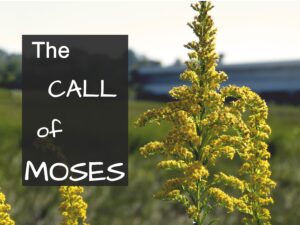
The book of Exodus tells the story of God’s historical and dramatic deliverance of His people, and of the man God uniquely prepared and used in His redemptive story. Moses was born a Jew, adopted into Egyptian royalty, and educated as an Egyptian prince. At age 40, he chose to become a defender of the Jews. He failed miserably. Rejected by his people and on the run from Pharoah, he fled to the land of Midian, established a new life and family, and lived for the next 40 years. While Moses had no earthly idea that he would return to Egypt, much less participate in a great work, God spiritually prepared him.
Moses learned humility. Proud people are capable of great achievements and outward successes, but not spiritual leadership. At age 40, Moses had the education and aptitude for human – not spiritual – greatness. Moses needed to learn humility: a spiritual virtue developed living at the end of our rope with less of me and myself and more of God and His strength. Seldomly learned in places of privilege, education, and achievements, Moses’ spiritual character was refined through his failures in Egypt and his life in the wilderness.
Why did Moses need to learn spiritual humility? You cannot convince people God is great and you are great at the same time, and Moses spoke for God. More profoundly, Moses possessed the power of God’s call and God’s might. God entrusted Moses with the power to exact plagues, divide waters, receive His Word, and glimpse His glory. To possess such power and not be corrupted by it is rare.
The Moses story told in Exodus-Deuteronomy is not hagiography. It reveals his frailties, struggles, and failures as a man and leader, but it also reveals his spiritual transformation. “Now Moses was a very humble man, more humble than anyone else on the face of the earth.” (Numbers 12:3)
To prepare Moses to lead a people who often did not want to be led by him or anyone, Moses learned servanthood. The book of Hebrews testifies, “For every house is built by someone, but God is the builder of everything. Moses was faithful as a servant in all God’s house.” (Hebrews 3:4,5) The heart of a servant was probably not learned in an Egyptian palace with royal privileges. At age 40, Moses went from royalty within Egypt to a nobody in the wilderness. There, Moses learned servanthood by living as a shepherd, tending sheep in obscurity. And it was in the wilderness that Moses learned to trust God.
Approximately 14,600 days passed between Moses’ departure from Egypt to his call to return. In those days, the son of a Hebrew, Egyptian prince, freedom fighter, and fugitive-who-became-a-shepherd learned a simple and most profound truth. His life was not about him. He was not the captain of his own ship or master of his own destiny. Slowly and over time, God brought Moses to the place of surrender and service. His life, mission, and destiny had become about who God is and not who he was.
After God delivered His people out of Egypt, under Moses’ leadership, Moses led the people in song and celebration. “Who among the gods is like you, Lord? Who is like you— majestic in holiness, awesome in glory, working wonders? The Lord is my strength and my defense… He has become my salvation. He is my God, and I will praise him.” (Exodus 15:13,2)

Sharing this with one of my Bible study groups